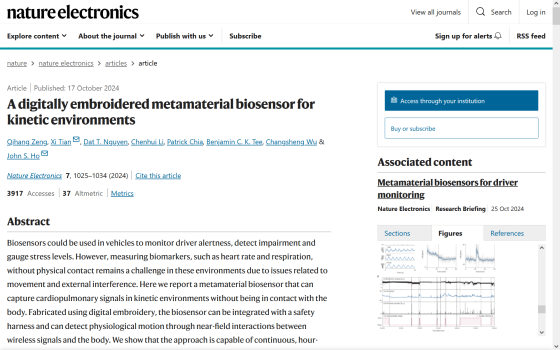A biosensor that can be embedded in a seatbelt to track human vital signs in real time has been created

Researchers from the National University of Singapore and Tsinghua University in China have developed a sensor that can measure a person's heart rate and other parameters without touching the skin. By incorporating the sensor into seat belts, it could be useful in preventing traffic accidents.
A digitally embroidered metamaterial biosensor for kinetic environments | Nature Electronics

Seatbelt-integrated biosensor could reliably track the alertness and stress of pilots and drivers
John Ho of the University of Singapore and his colleagues point out, 'Biosensors can be installed in cars to monitor the driver's alertness, detect mental and physical disorders, and measure stress levels. However, it remains difficult to measure biomarkers such as heart rate and breathing without physical contact due to issues with the wearer's movements and external interference.' To solve these problems, they have developed a sensor that can measure biomarkers even through clothing.
In the image below, the white band attached to the seat belt is the biosensor, the band on the chest is for measuring breathing, and the sensor on the right arm is for the electrocardiogram.

The biosensor can be placed over your clothing to measure your breathing and heart rate.

The biosensor developed by Ho and his team is based on a 'metamaterial' design, in which conductive threads that function as sensors are woven directly into the seat belt. This design makes it possible to detect subtle physiological responses through the garment while reducing environmental noise from vehicle vibrations and other passengers.
Ho and his colleagues tested the performance of the biosensor in a simulated airplane cabin and in a real moving car, and showed that it 'fits the user's body well and can reliably detect subtle cardiopulmonary signals even in dynamic environments.'
'We drove a car for 1.5 hours under various traffic conditions in Singapore and demonstrated that the biosensor is not affected by the surrounding environment. We further evaluated its monitoring capability in an in-flight aircraft simulator and successfully detected slight changes in heart rate in a person waking from sleep. These results highlight the potential for the biosensor to provide reliable monitoring in a variety of environments,' said Ho et al.

The biosensor developed by Ho and his team may soon be improved and tested in more realistic scenarios, and one day it could be integrated into seat belts in cars and airplanes to detect heart failure while driving.
Co-researcher Xi Tian said, 'Our biosensor can continuously and reliably monitor a driver's heart rate and breathing while the vehicle is moving. Future work will focus on miniaturizing the sensor's wireless components and integrating them into a compact module for efficient mass production. We also aim to develop algorithms that analyze physiological data to assess a driver's fatigue, stress and health. We plan to work with car manufacturers to refine and validate the system in real-world environments.'
Related Posts:







